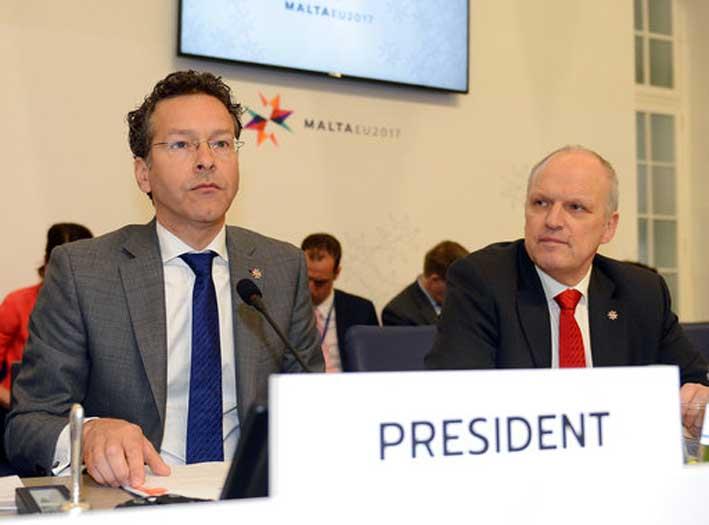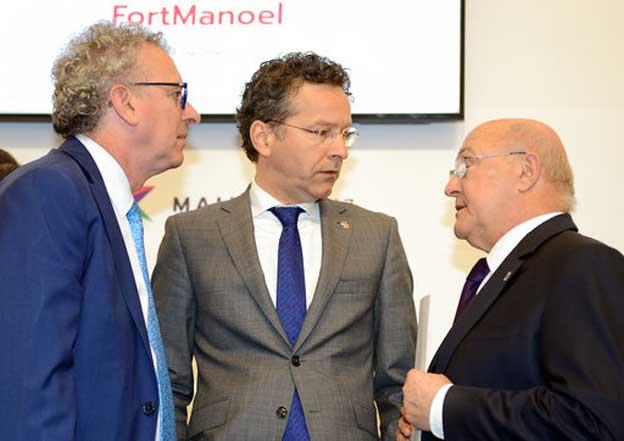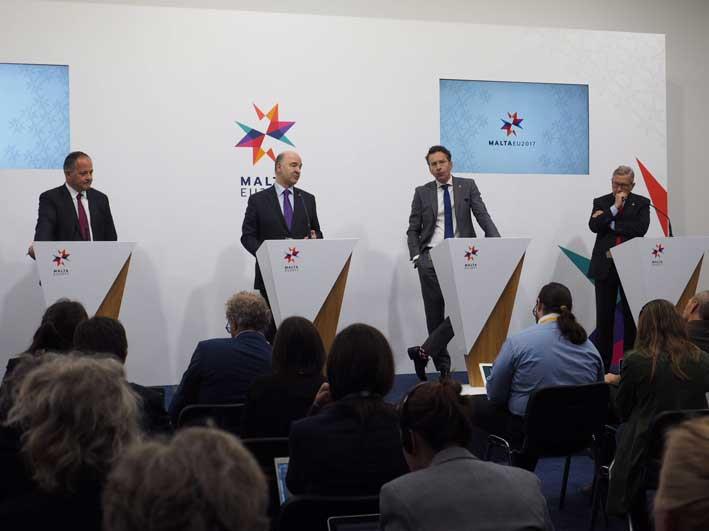Eurogroup Chairperson Jeroen Dijsselbloem said that Greece and its creditors have reached a positive agreement, which he called very “good news”, this morning in Malta.
Mr Dijsselbloem was addressing a press conference following a Eurogroup meeting. It was said that representatives of creditors will be going back to Greece at the earliest in order to finalise the second review of the now infamous Greek bailout programme.
“We agreed that measures 1% of the GDP will be implemented in 2019 and 1% of GDP in 2020,” Mr Dijsselbloem said. He explained that “pension cuts will be implemented in 2019 and lowering the tax-free threshold in 2020.” These two measures total €3.6 billion alone.
“The good news today is that we solved a number of big issues on big reforms which are needed. The details of that will be filled in and the documents will be written and agreed upon between the institutions, meaning they will have to go back to Athens for the review. The Eurogroup will see everything come together, and I’d like the situation resolved as quickly as possible.
“The situation in Greece is not improving and we are all at fault, momentum is slipping away from us and we need to work fast,” he said.

The meeting took place this morning in Valletta in an effort to make some progress after a gridlock took place on Greece’s bailout. Meetings in Brussels and Berlin earlier this week failed to amount to anything that would lead the way for financial aid to Athens, to the tune of €7 billion.
"The big blocks have now been sorted out and that should allow us to speed up and go for the final stretch," Jeroen Dijsselbloem told reporters following a meeting of the eurozone's 19 finance ministers in the Maltese capital of Valletta.
Once a broad agreement is reached in coming weeks, Dijsselbloem said the eurozone will come back to issues related to Greece's stringent medium-term budget targets and the country's debts — key conditions of the Greek government.

EU Commission Vice-President Valdis Dombrovskis said a deal on the latest steps to keep Greece afloat should be within reach by the time the eurozone ministers meet again on May 22 — easily in time for Greece's next big debt-repayment hump in July.
Another key development on Friday appears to be the ongoing involvement of the International Monetary Fund, which has been part of Greece's bailout programs since the first rescue back in 2010.
In recent months, there has been an open disagreement between the IMF and the eurozone over such matters as the sustainability of Greece's debts going forward.
"There is agreement on these main topics, on these big reforms, on the size sequencing and the timing — that is with the IMF absolutely yes," Dijsselbloem said. "I could not talk about an agreement on those issues if the IMF had not agreed."
The broad outlines of Friday's agreement involve Athens making further economic reform commitments until 2020.

Without the loan, Greece would struggle to make a debt payment in July, raising anew the prospect of default. The last time, Greece faced potential bankruptcy was in July 2015, when the Tsipras government eventually agreed a three-year bailout that could amount to 86 billion euros ($91 billion).
Greek Prime Minister Alexis Tsipras said earlier this week that if a breakthrough on plans to pay Athens the next installment fails to materialize over coming days, then the eurozone should hold a special meeting of leaders.
Friday's developments appear to have put paid to that threat.
Tsipras had blamed unnamed negotiators among Greece's European creditors and the International Monetary Fund for "moving the goalposts" each time Greece was close to meeting approval conditions for the bailout.
Even Wolfgang Schaeuble, the German finance minister who has been one of Greece's sharpest critics over the past few years, said he didn't expect any major hitches ahead. "The longest distance is behind us," he said.
As part of its third international bailout agreement, Greece has to make a series of sweeping reforms to its economy in return for the loans. But the talks have dragged on for months, freezing the latest loan payout and hurting the chances of a self-sustaining Greek economic recovery after years of recession and turmoil.
Tsipras' left-led government is pushing for a comprehensive deal that would cover more than just spending cuts and reforms by Greece, but also alleviate the country's debt burden and pave the way for its return to international bond markets later this year.
Greece has depended on international bailouts since 2010 after it was unable to borrow on international bond markets.
To receive the money, successive governments slashed incomes, hiked taxes and implemented market reforms. Though helping to put the public finances on a surer footing, the measures came at a cost — the Greek economy lost a quarter of its output.
Dijsselbloem conceded that the failure to agree the release of the next batch of bailout funds had harmed Greece's economic recovery in recent months.
"That momentum is slipping away from us so we really need to work fast and have it done certainly well in time for the next payments Greece has to make," Dijsselbloem said.
Currently demanded cutbacks include new pension cuts, a broadening of the tax base, labor reforms and privatizations. These will require approval by Greece's parliament, where Tsipras holds a three-seat majority.